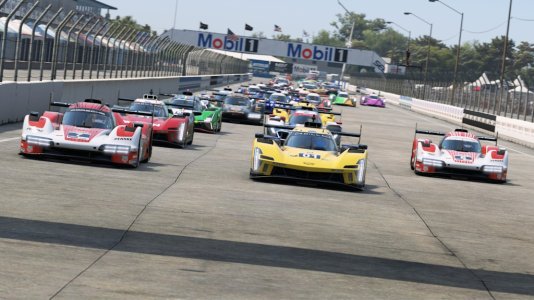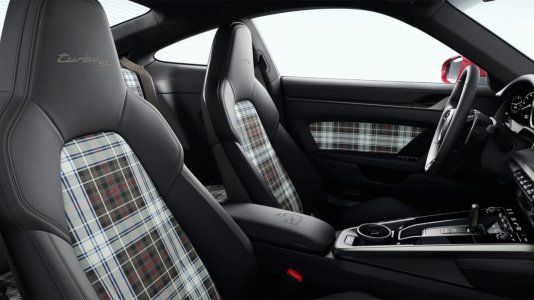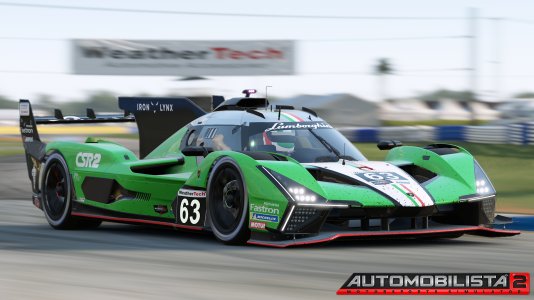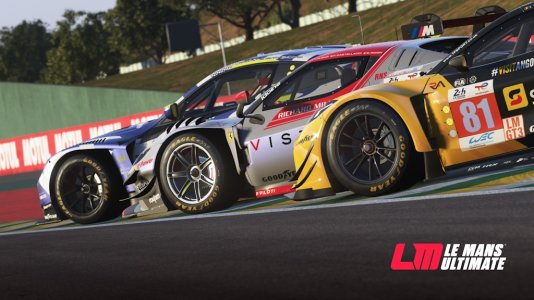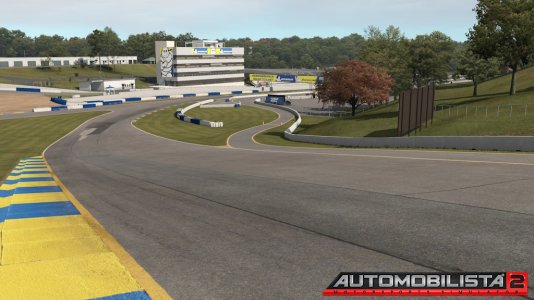Paul Jeffrey
Premium
Virtual Reality is fast becoming a mainstream alternative to the traditional ways we view our gaming experiences, but is it a long term solution for sim racers? RaceDepartment has a think on the subject...
In the not too distant past Virtual Reality (or VR for short) was the lone possession of a select few arcade machines simulating anything from first person shooters to Battle of Britain style fighter pilot games, yours for a few minutes of gaming pleasure in exchange for a healthy handful of loose change and presented in a strictly controlled environment. In fact I can clearly recall my first VR experience back in the mid to late 1990's at a local arcade in the north of England, strapping on a bulky headset and piloting the guns of a 'Red Barron' style double winged aircraft as enemy planes (actually more like pixelated dots at the time) flew above me and I gasped in awe at the realism of it all. Of course with the steady march of technological progression over the years that game would be laughed out of the door nowadays, but at the time the experience felt simply mind blowing.
Step in to 2017 and Virtual Reality has progressed at such a rate that the first serious VR headsets are slowing beginning to feed into the general gaming population. Back in 2012 Oculus began a Kickstarter initiative to develop their own VR headset for PC gaming, very quickly exceeding their initial funding target and in the end raising a staggering $2,437,429 across 9,522 backers - putting the wheels in motion for what has turned into a technological arms race to establish a clear lead in the quest for mainstream VR access in modern gaming. As of February 2017 Oculus (now owned by Facebook) have been joined in the VR marketplace by such industry giants as Sony with their PlayStation VR headset for console users with the HTC Vive now a genuine alternative for PC players, albeit a little more expense at around £700 in comparison to the Rift which retails around the £500 mark and the PSVR which usually comes in at a reasonable £350.
Mainstream VR technology is still very much in it's infancy, with issues surrounding the pixel density one of the main concerns from members of the public perhaps looking to upgrade from their current viewing solutions. As of today, no current VR headset can hope to match the graphics quality one can achieve with a standard monitor setup, let alone come close to the Ultra HD / 4k screens some lucky gamers have access to within their own gaming rooms. Couple this with the need to pack some serious hardware into your gaming PC in order to run the vast majority of VR ready title's at a reasonable performance level, it quickly becomes clear that VR gaming has not quite reached the stage where everyone would be willing to take up the obvious advantages, despite the many remaining pitfalls of the technology.
No doubt as the technology matures further in the coming years and more companies join the VR bandwagon these obstacles will be overcome in time, leaving open the original question posed by this post - is VR the future for racing simulations?
In order to answer that question I feel we first need to ask ourselves a series of questions to determine exactly how VR might fit into our future gaming requirements. The first question many serious sim racing enthusiasts may ask is - does running VR increase the immersion of simulation racing? Or in other words, do I feel more like I am driving a real race car when viewing the action from a headset rather than on a monitor (or three). For me the simple answer is yes, considerably so.
Using VR in a sim racing title is simply one of the most incredible things I have ever had the pleasure of experiencing during my many years playing racing games. The purity of the feeling of being strapped into a car is quite simply incomprehensible until you try it for yourself. With VR you are quite simply sitting in the car yourself, you are at one with the machinery around you and suddenly you find yourself transported from one who is playing an approximation of the real thing to someone who is physically part of the experience itself. It really is that good. Prior to trying VR myself for the first time I, like many others, watched a series of videos of people playing racing games with the headset on. I've seen countless videos of people looking around the environment inside the car, leaning forward to check the dials and generally making the most of the ability to completely experience the virtual world in which they are participating. That's all really cool. So cool in fact I decided that would be a great reason for purchasing VR and trying it out myself. This is where my mind was simply blown the first time I took the humble KTM X-Bow out around Spa in Assetto Corsa pretty much as soon as the headset arrived. It's not just the ability to look where you want in game that makes VR, after all you can achieve something similar with trackIR, it's the 3D aspect that really takes away the breath, an experience that simply cannot be captured watching YouTube videos of people playing in VR.
I can't make this point enough... wearing a VR headset you are quite literally inside the cockpit of your car. The feeling and visuals you experience are simply breath taking. It really is amazing how the mind can be tricked into convincing your body you are sat inside the machine, so much so that even though at the time I'm running a big Fanatec BMW rim on my rig my brain see's the in game car wheel and convinces my body that I'm holding that specific size and shaped wheel. It's a spooky experience...
So far so good. In order to try and remain objective and keep this piece balanced, let's turn our attention to some of the immediately obvious issues one encounters when first sampling a VR headset within a sim racing environment. Namely motion sickness.
Now I am not one who easily suffers from motion sickness and I appreciate that views on this topic are subjective to how each individual reacts to the experience of wearing a VR headset for prolonged periods of time. When my Oculus first arrived I found myself only able to really drive comfortably for around 15 minutes at a time without the need for a break. After the 15 minute mark I started to feel a little bit queasy and hot under the collar due to the visual sensations received from the headset. This was using Assetto Corsa. If playing something slightly more visually taxing like DiRT Rally, then trying to complete a stage without removing the headset was basically impossible for me. This quickly became a concern. However after reading some of the considerable amounts of information on the internet my concerns gradually faded away, it is commonly acknowledged that players new to VR have to establish their "VR legs" so to speak, giving the mind and body a chance to adapt to this new experience. For me personally after around a week or so spent with the Rift I quickly overcame the initial sickness feeling and can now use my headset without issues for as long as I wish, running multiple races in one session or completing endurance stints of several hours at a time. Just because I now feel comfortable is no guarantee that everyone will share the same experience however. This factor needs to be considered before making a purchase yourself. I've heard a few people simply couldn't get on with the experience and have sold off their headset because of it.
So, does using VR make you faster? This is a very difficult question to answer, and the response will be different for each individual person. Taking my own experience with the Oculus Rift I would argue that I'm a quicker driver with the headset than without, and for sure my positional awareness and ability to navigate traffic is greatly improved because of VR.
The advantage of Virtual Reality over traditional monitors is most prominent when considering depth awareness. Because you are now firmly planted within a 3D environment, the curbs and track immediately in front of you are infinitely more prominent and "alive" than what is experienced on a tradition 2D screen setup. I feel using the headset I can pick out an apex much easier than before, and hit the apex on a considerably more consistent basis than was possible without the headset. The reason for this can be attributed to several factors in my opinion. Firstly the 3D environment is much closer aligned to the real world one is used to, and therefore the brain doesn't have to compensate for the lack of 3D images when picking out details of the track on a 2D screen. In a standard screen setup you have to apply a little bit of estimation between real and virtual when entering a corner as your eyes and brain are seeing something presented to you differently (i.e. in 2D) than you would experience in the real world. With VR you are in the car yourself and everything is as it would be in real life, the element of estimation has been removed. The track / corner / apex is presented to your eyes in 3D, as it would be in real life. Added to this you can see the depth of the apex and track much easier, it is quite simply a much more accurate representation of that particular piece of tarmac that you would find outside of a VR situation. For me at least this makes hitting the apex a much simpler and more natural experience, which obviously has a positive effect on overall laptimes.
Conversely because of the current lack of high resolution graphic rendering capabilities using VR, one could find it more difficult to accurately judge far off braking points using the headset, in comparison to the standard one or three monitor setup. For example when playing Assetto Corsa in the rift, despite having high in game visual settings and making VR specific adjustments to the pixel density, far off objects still remain considerably less clear than they ideally could be. This impacts the ability of the player to look up the road and make an accurate judgement of a far off braking zone and can even cause the eye to miss potential track blockages that would otherwise have been obvious to a monitor user. Over time one develops the ability to shut out this issue and compensate subconsciously for the lack of long draw distance quality, but it must be taken into account when considering the laptime advantages offered by using the rift or not. Personally I find this distraction to be of secondary importance compared to the additional immersion offered by the headset and improvements in the ability to pick out an apex and better understand depth perception within a game. This may not be the same result for other users and should be taken into account when considering purchasing a virtual headset device.
If truth be told it's still very early days in the world of Virtual Reality gaming and current VR headsets such as the Oculus Rift and HTC Vive have quite a way to go until they are capable of matching the visual fidelity of mid to high range monitor setups. Even with that taken into consideration I firmly believe (aside from the invention of FFB wheels) Virtual Reality is the single most impressive enhancement to a sim racers experience in the last dozen years. If you can afford to spend a not inconsequential amount of money on a device, and you are willing to overlook the drawbacks of the lower resolution produced by current units, then Virtual Reality isn't really the future of sim racing - it's the present day, right here, right now.
Will the technology improve over time? Yes I expect it will get considerably better over the next five years or so, but to be perfectly honest what we have available right here today is an outstanding piece of kit that will help take many sim racers above and beyond the levels of immersion they ever thought possible. It's tomorrow's technology, available and working on today's simulations. I love it.
Current racing / driving sims that support VR headsets include: American Truck Simulator, European Truck Simulator 2, Assetto Corsa, iRacing.com, Project CARS, RaceRoom Racing Experience, Live for Speed and DiRT Rally.
If sim racing equipment is your thing or you just want some advice before making a purchase, head on over to our Sim Racing Hardware sub forum here at RaceDepartment and engage with the often knowledgeable, and always helpful community members on a wide range of sim racing related equipment.
Do you think Virtual Reality is mature enough to become a "must have" piece of tech in sim racing? Do you expect the technology to improve in time? Have you tried VR yourself and what do you think? If you don't have a VR set, what is the main think that keeps you away? Let us know in the comments section below!
Last edited:



